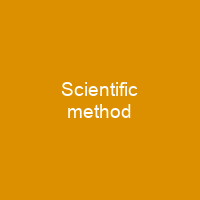The Scientific Method: A Journey of Discovery
Imagine the scientific method as a map to uncovering the mysteries of our world. It’s not just a series of steps but a dynamic, iterative process that guides us in understanding and explaining phenomena. Is it really as simple as following a recipe? Let’s dive into this fascinating journey.
The Core Components
The scientific method involves several key components: making conjectures (hypothetical explanations), predicting the logical consequences of these hypotheses, carrying out experiments or empirical observations, and testing predictions. A hypothesis must be falsifiable to hold any meaningful value. Can you imagine a world where unfalsifiable ideas are considered scientific?
A Historical Perspective
The term ‘scientific method’ emerged in the 19th century, as institutions began to clearly distinguish between science and non-science. However, its application has been debated throughout history. Is there a universal scientific method? Critics argue that it is not a fixed sequence but rather a set of general principles. The scientific community agrees on basic components like characterizations, hypotheses, predictions, and experiments, which are subject to peer review.
The Discovery Process
The discovery of DNA’s structure exemplifies the scientific method in action. Watson and Crick made conjectures about genetic inheritance, predicted the mechanism for storing genetic information in DNA, conducted experiments, analyzed results, and drew conclusions that led to a new understanding. Can you think of other groundbreaking discoveries that followed this process?
The Role of Experimentation
Experiments are crucial in the scientific method. They test predictions and support or contradict hypotheses. The experimental control technique helps isolate variables, identify important factors, and reduce personal bias. Different experiment shapes exist, from laboratory settings to archaeological excavations. Large instruments require significant resources and shared access, promoting openness and accountability.
The Iterative Nature of Science
Science is an iterative process. At any stage, it’s possible to refine its accuracy and precision. Failure to develop a hypothesis may lead scientists to redefine the subject under consideration. Published papers can be built upon, leading to continuous improvement in understanding. Does this mean that science is always moving forward?
The Importance of Reproducibility
Reproducibility is key in scientific research. Experiments must be repeatable by others within the scientific community. This ensures reliability and validity. The experimental control technique helps isolate variables, identify important factors, and reduce personal bias. Different experiment shapes are possible, including laboratory settings, double-blind studies, archaeological excavations, and even flights.
The Limits of Science
While the scientific method is powerful, it has limits. Questions outside its domain (such as faith) and limitations due to the observer’s conceptual framework and incomplete information are inherent. Can science answer all questions? The practice of experimental control and reproducibility diminishes the effects of circumstance and personal bias.
The Role of Theory Building
Theory building involves forming hypotheses, testing via deductive reasoning, and revising as new proof emerges. Inductive method involves deriving scientific truth through inductive reasoning, often using data-mining projects or large-scale observation. Mathematical modeling involves formulating hypotheses followed by building mathematical constructs to test instead of conducting physical laboratory experiments.
The Philosophy of Science
The philosophy of science seeks to evaluate theories based on several criteria: accuracy, consistency, explanatory power, unificatory power, and fruitfulness for further research. Scientists strive to adhere to principles like parsimony in causal explanations and invariant observations. However, these criteria contain subjective elements and should be considered heuristics rather than definitive guidelines.
The Role of Heuristics
Heuristics play a crucial role in scientific discovery. They help researchers navigate complex problems and find solutions. For example, the Poincaré conjecture was proved using time as a mathematical concept. However, the connection between mathematics and reality is obscure. How do we reconcile these two worlds?
The Future of Science
The future of science lies in embracing complexity and interconnectedness. The scientific method may be difficult to apply stringently to diverse, interconnected systems and large data sets. Practices used within Big Data, such as predictive analytics, may be considered to be at odds with the scientific method.
Conclusion
The scientific method is a dynamic process that guides us in understanding and explaining phenomena. It involves making conjectures, predicting logical consequences, conducting experiments, analyzing results, and drawing conclusions. While it has its limits, it remains a powerful tool for uncovering the truths of our world.

You want to know more about Scientific method?
This page is based on the article Scientific method published in Wikipedia (retrieved on December 8, 2024) and was automatically summarized using artificial intelligence.




